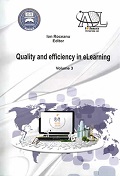WIKI TOOLS IN TEACHING ENGLISH FOR ACADEMIC PURPOSES - IT AND LANGUAGE PROFICIENCY AS PREDICTORS OF ONLINE PARTICIPATION
WIKI TOOLS IN TEACHING ENGLISH FOR ACADEMIC PURPOSES - IT AND LANGUAGE PROFICIENCY AS PREDICTORS OF ONLINE PARTICIPATION
Author(s): Liana Stanca, Cristina FeleaSubject(s): Education
Published by: Carol I National Defence University Publishing House
Keywords: Web 2.0; English for Academic Purposes; IT proficiency; Language proficiency; Statistical analysis
Summary/Abstract: The major societal changes brought about by the Internet, particularly in the past decade, have played an important role in the rethinking of the teaching/learning process and of students' and teachers' roles in higher education. The authors have been studying various aspects of a blended learning programme for studying English for Academic Purposes they have implemented at Babes-Bolyai University, the Faculty of Sociology and Social Work (2009-present). As a result of technology advance in all areas of life and its increasing presence in teenagers' life (by means of formal and informal education),we can assume that undergraduate freshmen's IT skills levels will allow them to adopt easily the online component. Similarly, we can assume students are also fairly proficient in a foreign language, in our case English, due to the generous provisions of foreign language study offered by Romanian primary and secondary education. One of the authors' pilot studies showed that there is a relatively strong correlation between students' profile - (self-reported) higher level of English, previous experience in use of Web 2.0, willingness to work collaboratively - and an increased degree of participation in online activities. The present study aims to verify this correlation across three academic years by means of a questionnaire-based statistical analysis and corroborate the results with the presumed higher levels of IT and foreign language skills of current student cohorts. The authors conclude that IT and language proficiency are good predictors and, in order to implement successfully the online component, further training and support for IT use for learning and language development are needed.
Journal: Conference proceedings of »eLearning and Software for Education« (eLSE)
- Issue Year: 9/2013
- Issue No: 03
- Page Range: 312-321
- Page Count: 10
- Language: English

